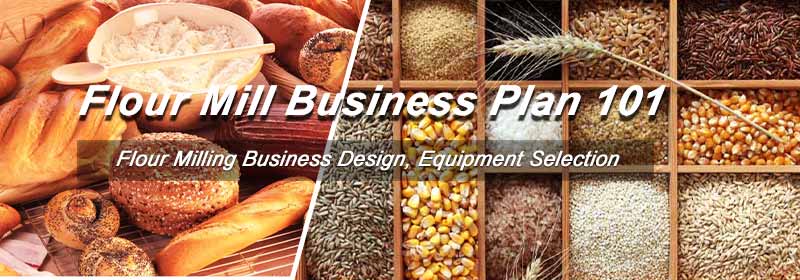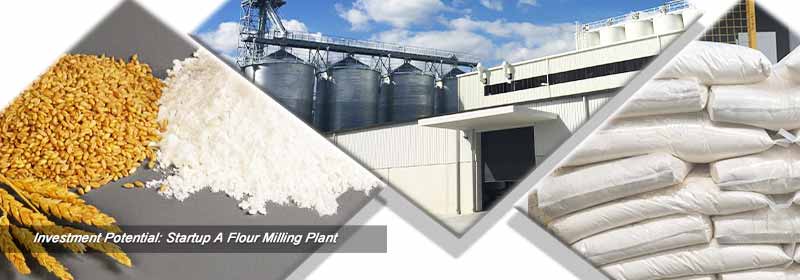Profitable Flour Mill Business Plan 101
With the continuous growth of the global population and the increasing consumer demand for healthy, nutritious, and diverse food, investing in the flour processing business holds significant potential. From small home-based workshops to large industrial-scale production, investors of varying sizes can find opportunities that suit their needs.
Are you aiming to start or grow your flour mill business? Discover essential knowledge on a wide array of flour raw materials—wheat, maize, rice, soybean and more, as well as help you setup your customized commercial flour mill plant.

Start Your Flour Mill: A Journey from Business Plan to Profitability
Purchasing flour milling equipment from ABC Machinery—a professional flour milling machine manufacturer and supplier—can help you set up a low-cost, complete flour milling plant for starting a flour milling business in Nigeria, Kenya, South Africa, Tanzania, Morocco, Egypt, India, Pakistan, Indonesia, the Philippines etc..
Interested in learning more about flour mill business plans for different grains? Check out our other articles in this dedicated section. We cover various flour sources, including wheat, corn/maize, rice, and cassava. Here, our comprehensive guides will analyze the feasibility of your flour mill investment and provide expert advice on selecting the right milling equipment, sourcing high-quality grains, marketing your products, and expanding your customer base.
Customized Flour Production: Developing a Personalized Flour Mill Business Plan
The success of a flour mill business hinges on multiple factors, with the selection of suitable flour processing equipment being paramount.
When it comes to flour milling equipment, the machines used for milling different types of grains such as wheat, corn, rice, and cassava are indeed specialized and different from one another. Each type of grain has unique characteristics, requiring specific machinery and processes to achieve the best results. Here are the distinctions between the equipment used for milling these different types of flour:
|
Aspect |
Preliminary Processing |
Initial Grinding |
Unique Steps |
End Product |
|---|---|---|---|---|
|
Wheat Flour Milling |
Cleaning, Conditioning |
Roller Mills |
Conditioning wheat to adjust moisture content |
Various grades of flour (bread flour, pastry flour, etc.), bran, germ |
|
Corn (Maize) Flour Milling |
Cleaning, Degermination |
Hammer Mills |
Degermination to remove germ and bran |
Coarse to fine cornmeal, corn flour, germ, bran |
|
Rice Flour Milling |
Hulling, Polishing |
Stone or Roller Mills |
Hulling and polishing to produce white rice before milling into flour |
Polished rice, rice flour, bran |
|
Cassava (Tapioca) Flour Milling |
Chipping, Peeling, Grating, Pressing |
Graters, Hammer Mills |
Moisture removal through pressing before final grinding |
Fine cassava flour (tapioca), cassava pulp |
Key Differents:
-
Grain Characteristics: The hardness, moisture content, and oil content of the grains differ, influencing the choice of milling machinery.
-
Processing Steps: Each type of grain requires different preliminary processing steps. For example, rice needs hulling and polishing, while corn requires de-germination.
-
Finished Product: The desired fineness and quality of the flour vary, requiring different sieving and purification techniques.
While there are some similarities in the basic principles of milling, the equipment and processes are tailored to the specific characteristics of each type of grain. Therefore, selecting the appropriate flour processing machinery is crucial for your milling project and customized flour mill business plan.
To learn more about starting a profitable milling business, click the consultation button below to request a free flour mill business proposal!
Feasibility Analysis for Starting Grain Milling Business

Invest a Cost-effective Flour Milling Factory
The success of a flour mill business is influenced by various factors, including the strength of the business plan, efficiency in controlling production costs, and the implementation of effective market strategies.
Flour Milling Market Potential and Strategic Planning
For entrepreneurs considering the launch of a wheat or maize milling venture, a comprehensive market analysis within the business plan is important. Here are 2 typical cases:
-
Corn/maize Flour Business in Africa
Due to population growth and urbanization, the demand for maize in Africa is projected to increase by 2.5% annually. This expanding demand offers significant opportunities for new entrants in the maize milling sector.
-
Wheat Flour Business in India
Similarly, the wheat flour market shows immense potential. In India, driven by increased consumption of bakery products and rising health consciousness, the wheat flour market is expected to grow at a CAGR of 4.5% from 2020 to 2025.
Tailoring Business Plans to Local Markets
-
In Uganda: maize flour is a staple in Ugandan cuisine, making the local market highly receptive to high-quality maize flour products. Catering to local tastes and preferences can significantly enhance market penetration and business success.
-
In India: For those aiming to set up a wheat flour production operation in India, understanding local consumption patterns is vital. Indian consumers favor whole wheat flour (atta) for making traditional bread (chapati). By comprehending these market dynamics and adjusting product offerings accordingly, businesses can capture a substantial market share.
Balancing Flour Milling Production Costs and Operational Efficiency
The expenses involved in establishing a milling plant can vary widely based on the scale of the operation and the type of machinery employed. A detailed flour production business plan should outline the entire process from raw material procurement to final product sales, including how technological innovations can reduce costs and improve product quality. Automated milling systems can lower labor expenses and increase productivity, while quality control systems ensure that the flour meets market standards.
With over 20 years of experience in the flour mill industry, ABC Machinery has become a leading supplier of turnkey flour milling projects, providing customers with high-quality machines, installation and commissioning services, and after-sales support. Whether you need a small-scale mill or a large commercial operation, we have the expertise and equipment to meet your needs. Contact us today for a free consultation and let us help you get started on your flour mill business journey!








